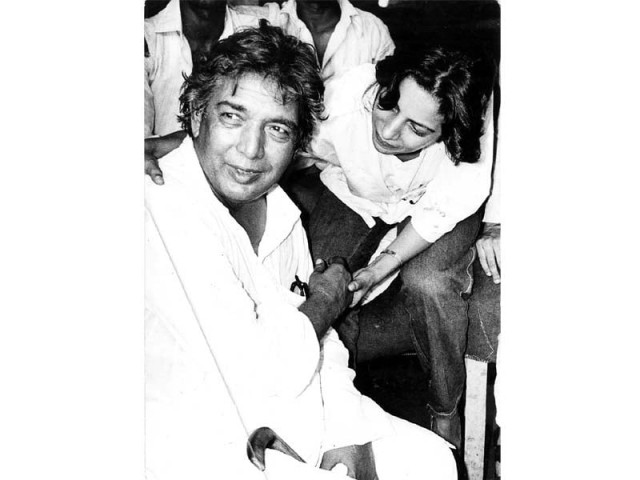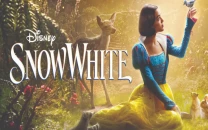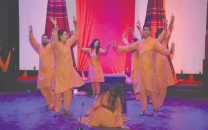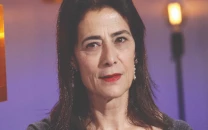The rebel who inked his gunshots
Remembering master Bollywood lyricist and poet Kaifi Azmi on his 13th death anniversary

As a child, Shabana Azmi hated her father’s messed up hair and white kurta pajama. PHOTO: AZMIKAIFI.COM
Partition saw a confluence of numerous industries and ideologues. While communities were shaping up along the lines of religion and language, an infant film industry sought refuge in the arms of the tradition of Urdu writing. At the helm of this confluence, was one such writer, lyricist, actor and political activist — Kaifi Azmi.
Approaching the end of the 20th century, the institution of mushaira regained a few breaths. Corporate and social backing meant aalmi mushairas were being held in India, Dubai and Karachi. Flanked by the likes of prominent poets Ahmed Faraz, Iftikhar Arif, Jaun Elia and Pirzada Qasim, Azmi remained a vivid part of the tradition till the day he passed away.
Be it classics such as Tum Itna Jo Muskura Rahe Ho and Chalte Chalte Yunhi Koi Mil Gaya Tha or the more politically conscious Basti Mein Apni Hindu Musalman Jo Bus Gaye are testimony to the fact that progressive writing, ghazal, nazm, feminism, humanism and film music in our part of the world owe a lot to the late writer.

Azmi belonged to the breed of Muslims who did not align themselves with the ways of the Muslim League — plausibly the reason why his visits to Pakistan were not appreciated on the state level. In an interview, eminent writer and Azmi’s son-in-law Javed Akhtar juxtaposed Azmi’s treatment in Pakistan with that of Faiz Ahmed Faiz in India (whom he noted was treated as royalty).
An elder sister of his who died of tuberculosis; at the funeral village elders told his father Syed Fateh Hussain Rizvi that the death occurred because she was taught the English language and not Urdu. Hence when Azmi grew up, instead of being trained in the language of his colonial masters, he was sent off to Sultanul Madaris, Lucknow to master the art of using the vernacular.
The child of destiny never chose Urdu nor did he choose what people had to say about his work. At the age of 11, he wrote his first ghazal — Itna To Zindagi Mein Kisi Ki Khalal Paray. He recited it at a poetry session where the attendees were of the view that the boy has stolen someone else’s work. Interestingly, even his father concurred. The 11-year-old ran home crying and brought an elder sister with him who testified that the words were in fact penned by Azmi himself. Begum Akhtar sang the ghazal later on and it gained wide acclaim.
At the age of 19, Azmi found himself in Bombay chasing the promise of India’s most happening city. He joined the ranks of the party whose flag is still hoisted at his family residence. By this time his writing had gained attention.
However it was Aurat, a poem that questions regressive notions associated with women in India in the backdrop of the freedom struggle that brought him to the fore. His future wife Shaukat, heard it for the first time at a mushaira in Hyderabad.
As much as he despised writing lyrics, Bollywood was the way forward for most of the poets back then and as a result, Azmi’s songs became anthems. He once said that writing lyrics for compositions is like looking for a right-sized corpse for an already dug up grave, yet the Azmi–Madan Mohan duo went on to produce some of the greatest classics of Indian cinema.
In a documentary produced by Indian TV channel News State; his daughter Shabana recalls how she was ashamed of her father’s outlook and profession during her school days. She hated Kaifi’s messed up hair and white kurta pajama. He would at max add a shawl to his attire when the wind was unbearable. While Shabana’s friends called their father’s Daddy, who wore suits and had corporate jobs, the way of life her Abba chose for himself was incomprehensible for Shabana.
Despite being the son of a landowner, Azmi’s world revolved around his most prized possessions — 18 Mont Blanc fountain pens that he would carry in a small wooden coffer. Black coffee and Charminar smokes were his other lifelong companions. His ideologues were sensitive and his canvas was big. He breathed his last on May 10, 2002.
Some of Kaifi’s famous works
Chalte Chalte Yunhi Koi Mil Gaya Tha – Pakeezah (1962)
Tum Itna Jo Muskura Rahe Ho – Arth (1982)
Ye Dunya, Ye Mehfil Mere Kaam Ki Nahin – Heer Ranjha (1970)
Kar Chalay Hum Fida Jan-o-Tann Sathiyon – Haqeeqat (1964)
Tum Bin Jeewan Kaisa Jeewan – Bawarchi (1972)
Published in The Express Tribune, May 10th, 2015.
Like Life & Style on Facebook, follow @ETLifeandStyle on Twitter for the latest in fashion, gossip and entertainment.



















COMMENTS
Comments are moderated and generally will be posted if they are on-topic and not abusive.
For more information, please see our Comments FAQ